#Ptolemaic Queen
Text

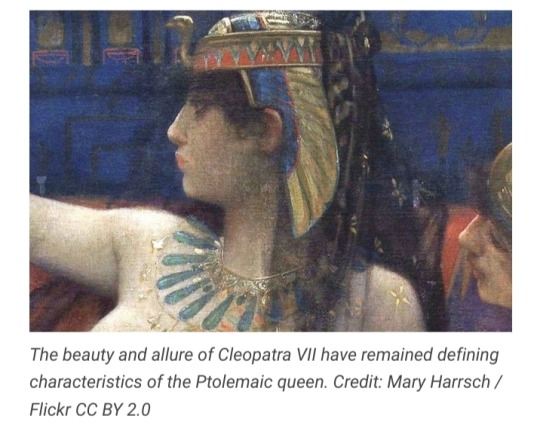
A significant part of Cleopatra VII Philopator’s enduring reputation is as one of history’s most famous femme fatales, renowned for her beauty and wit which attracted not one, but two of the Roman Republic’s most powerful men.
Whether or not this popular characterization of Cleopatra is historically accurate, her reputation has led many to wonder whether she had any particular beauty secrets that she used to ensure Julius Caesar and Mark Anthony.
The historical record does provide some clues as to how the Ptolemaic dynasty’s most famous ruler presented herself, from hairstyles to clothing, and even makeup.
Although we cannot be entirely certain how she presented herself, there are enough historical details to piece together a reasonable picture of how Cleopatra might have presented herself.
Was Cleopatra really a beauty?
As the old adage goes, “Beauty is in the eye of the beholder.”
As far as the ancient sources are concerned, the question of Cleopatra’s beauty raised mixed responses, with some ascribing an irresistible physical appearance to her and others attributing her allure more to her intellect and charm.
For example, Cassius Dio (164 to c. 235 AD), an ancient Greek historian, described Cleopatra as “a woman of surpassing beauty.”
During the first meeting between Julius Caesar and Cleopatra, Cassius Dio wrote:
"Caesar, upon seeing her and hearing her speak a few words, was so completely captivated that the Roman general acquiesced immediately to Cleopatra’s requests."
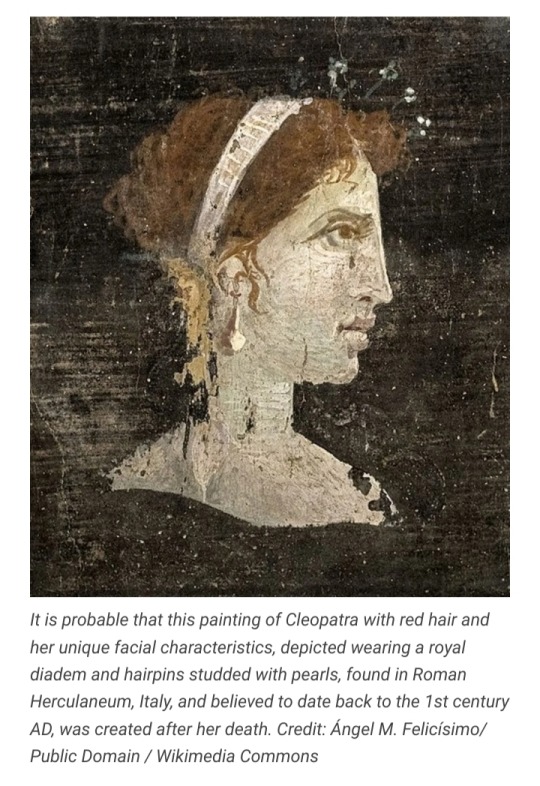
Plutarch (c.46 to c.119 AD) also briefly commented on the Ptolemaic queen’s appearance in his Life of Mark Anthony.
Contrary to Cassius Dio, Plutarch did not reckon Cleopatra’s beauty to be particularly noteworthy but instead praised her intelligence and character.
“Her beauty, so we are told, was not itself outstanding; it did not immediately strike those who saw her; yet being with her had an inescapable hold; when talking with her, she was persuasive, and the character which surrounded her whole manner in company had a force to it,” wrote the Greek historian and philosopher.
Hair and makeup
In the few surviving marble busts of Cleopatra, she is depicted wearing her hair tied at the back in a bun.
Historians like Paul Edmund Stanwick refer to this as a “melon hairstyle.”
Coinage depicting the queen shows her wearing the same hairstyle.
Depictions of Cleopatra with this hairstyle also show her wearing a diadem, a symbol of royal power adopted by many Hellenistic rulers who succeeded Alexander the Great as the masters of the divided fragments of his empire.

Professor Diana Kleiner of Yale University has identified two more hairstyles worn by Cleopatra.
One of these hairstyles emulated those worn by Macedonian queens, which is unsurprising given Cleopatra’s lineage.
To achieve this style, the hair was carefully divided into individual curls, which were typically swept away from the face and elegantly gathered into a bun positioned at the back.
According to Professor Keline, it may have been worn during travel.
The other hairstyle was “the usual Egyptian wigged headdress that had its origins in Pharaonic times.”
In this case, the main point of attention would have been the headdress rather than the hair itself, with a rearing cobra made of precious metal proudly displayed.
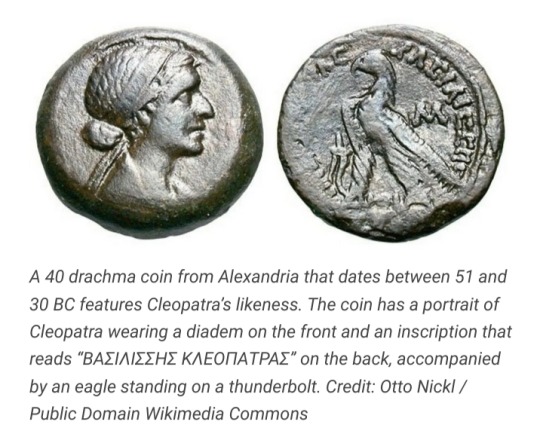
Professor Kleiner explains that “Cleopatra appears to have worn different coiffures in different circumstances, playing to her audience, so to speak, in life and in art.”
It would have been important for her to present herself in the Hellenistic fashion to the Greek elites who held the most senior positions in Ptolemaic Egypt, but also in traditional Egyptian fashions for her ruler to appear legitimate to a native Egyptian audience.
Regarding the Ptolemaic queen’s makeup choices, she would darken her eyebrows and enhance her eyeliner using black kohl, creating an elongated look.
The application of deep blue eyeshadow extended gracefully up to her brows, further accentuating her eyes.
Additionally, Cleopatra embraced the fashionable trend of adorning her hands with intricate henna patterns, a popular practice during that era in Alexandria.
Clothing
Cleopatra wore a variety of Greek, Egyptian, and Roman outfits intended to accentuate her beauty.
The selection of these styles would have been dependent on the contexts in which the queen appeared, as it was important for her to present herself accordingly to her friends, foes and subjects.
One of the styles she wore combined Greek and Egyptian aesthetic sensibilities and is seen depicted on sculptures of other Ptolemaic queens.
This style consisted of a sheer dress, likely of a semi-transparent material, which left the bare breasts exposed in a manner popular amongst native Egyptian women.
The depictions of other Ptolemaic queens wearing this style are consistent with the writings of the Roman poet Lucan, who claimed that she wore a transparent dress that exposed her breasts, likely made of Chinese silk.
Lucan also described the jewelry she wore, writing that “her baleful beauty inordinately painted, covered with Red Sea pearls, a fortune in her hair and around her neck, weighed down with jewelry.”
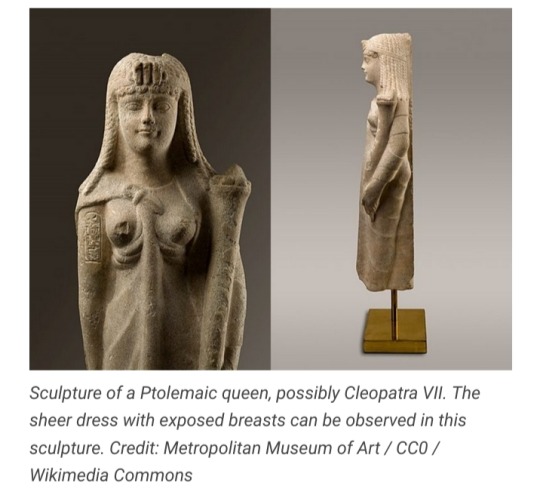
NOTE:
Cleopatra VII Thea Philopator (70/69 BC – 10 August 30 BC) was Queen of the Ptolemaic Kingdom of Egypt from 51 to 30 BC and its last active ruler.
A member of the Ptolemaic dynasty, she was a descendant of its founder, Ptolemy I Soter, a Macedonian Greek general and companion of Alexander the Great.
#Cleopatra VII Thea Philopator#Cleopatra#Queen of the Ptolemaic Kingdom of Egypt#Ptolemaic Dynasty#Ancient Egypt#Ptolemy I Soter#Ancient Macedonians#Julius Caesar#Mark Anthony#Cassius Dio#Plutarch#melon hairstyle#Egyptian fashion#Lucan#Ptolemaic Queen#Hellenistic fashion#Alexandria#Beauty Secrets of Cleopatra
44 notes
·
View notes
Text
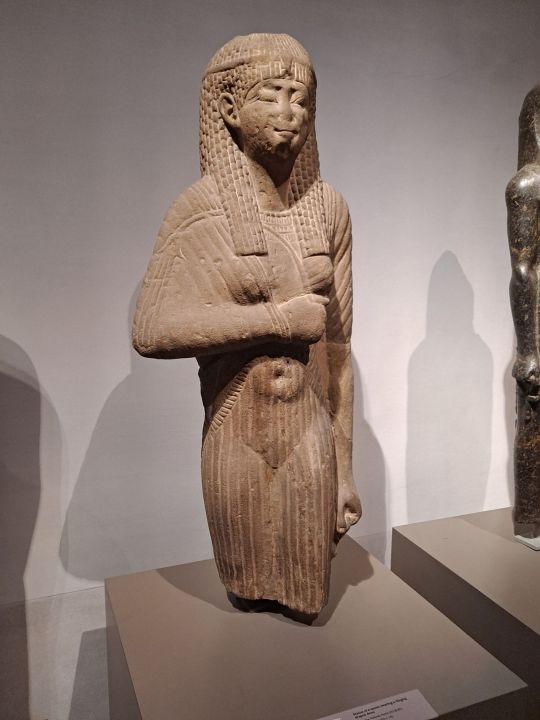
Statue of a queen wearing a clinging draped dress
* Egypt, Ptolemaic period
* sandstone
* Turin Egyptian Museum
Turin, June 2023
68 notes
·
View notes
Text
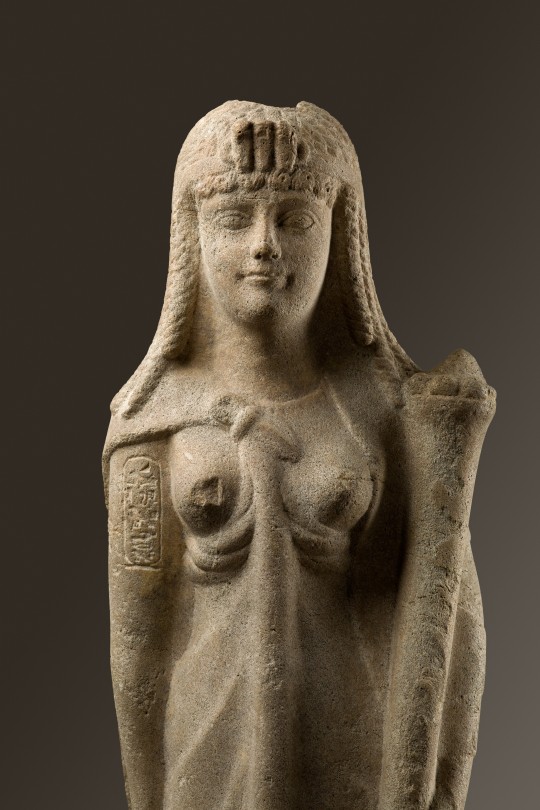
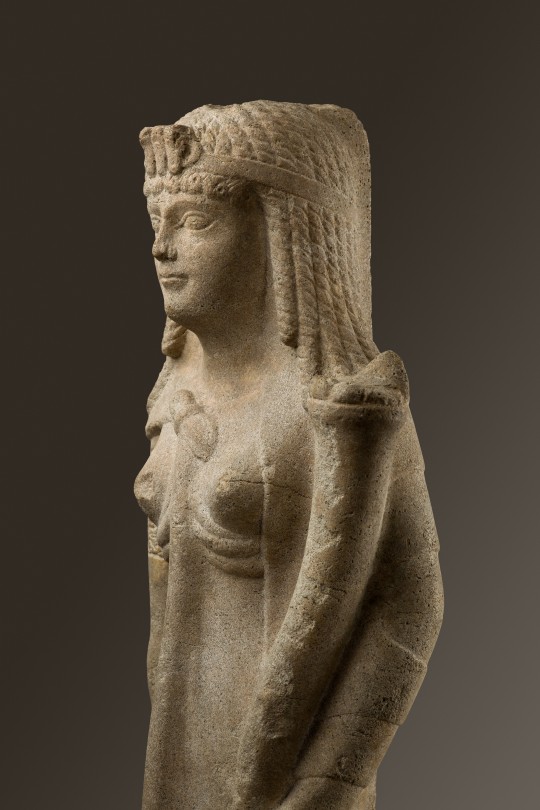
Ptolemaic Queen, perhaps Cleopatra VII, Ptolemaic Period, Egypt, c. 200–30 B.C.
Met Museum. 89.2.660
43 notes
·
View notes
Text

𝔗𝔥𝔢 𝔏𝔦𝔳𝔦𝔫𝔤 𝔐𝔲𝔪𝔪𝔶 𝔟𝔶 𝔉𝔯𝔞𝔫𝔨 𝔅𝔯𝔲𝔫𝔫𝔢𝔯
#Frank Brunner#The Living Mummy#art#artwork#mummy#Queen of the Ptolemaic Kingdom of Egypt#painting#illustration
39 notes
·
View notes
Text
You are LAUGHING. Black people are desperate for aspirational figures and instead of digging into history of subsaharan Africa they are trying to claim the last and most cringefail Egyptian dynasty, and you’re LAUGHING.
(Seriously. Jada, I know you have been trough some shit last year and probably need a pick-me-up, but seriously?! Who the fuck wants the Ptolemies?! That’s like when people claim Peter the Great slept with Menshikov; like, as a queer person, my honest answer to that is “we don’t want them”.)
#random history#queen cleopatra#queen cleopatra netflix#cleopatra netflix#the ptolemies#ptolemaic dynasty#this is why i was stoked for#the woman king#i don't care if it's historically accurate#it's a step in the right direction#i.e. realizing that SUBSAHARAN AFRICA HAS A HISTORY TOO#also of all the egyptian queens#why the one LEAST likely to be black?!#hatshepsut was Right There...
70 notes
·
View notes
Text
Did you know Cleopatra's daughter, Cleopatra Selene, rose to become a queen herself? The captivating story of Cleopatra’s children caught in a web of power and betrayal tells of their tragic fates and the secrets of a dynasty lost to history.
#Cleopatra VII#Cleopatra Selene#Egyptian Rulers#Roman Republic#Ptolemaic Dynasty#Caesarion#Mark Antony#empire#Egypt#Roman Figures#Queens#Julius Caesar#ancient#history#ancient origins
43 notes
·
View notes
Text

All hail the last Pharaoh of Egypt!𓋖
The Clever Goddess that brought Rome to it’s knees!𓊝
#history#pharaoh#cleopatra#queen#ancient egypt#womens history#ancient rome#girl power#historical figures#female leaders#coquette#ancient egyptian history#smart#female rulers#ancient#girl math#womens history month#femininity#ancient egyptian#queencore#ptolemaic egypt#women empowerment#royal history#philosopher#egyptology#powerful women#nickys facts
7 notes
·
View notes
Text

CLEOPATRA VII
Support me on Ko-Fi (Hi-Res Download):
#watercolor#watercolor illustration#watercolor painting#watercolor portrait#cleopatra#cleopatra vii#egyptian queen#egyptian pharaoh#egypt history#ancient egypt#queen cleopatra#ptolemaic
16 notes
·
View notes
Text
Cleopatra's Heritage
Her name means “father’s glory,” in the sense of “glorious lineage” (from the
Greek κλέος, kleos, “glory,” and πατρóς, patros, “of the father”). Cleopatra
isn’t actually Egyptian, but Greco-Macedonian.
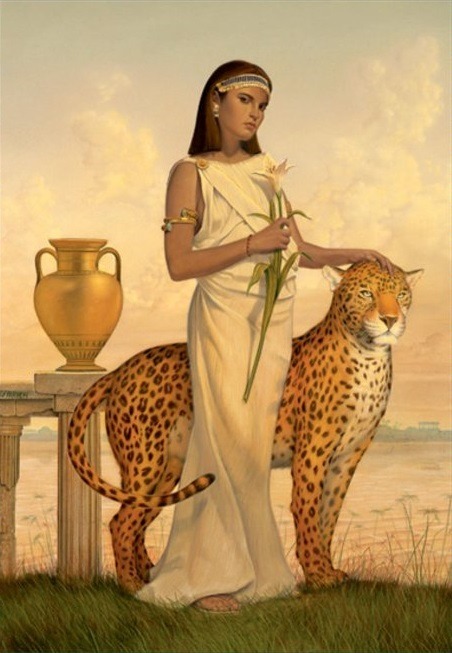
Although we perceive her name as unique in history and belonging to an
equally unique queen, she was not the only one to be called that. We know
of six others preceding her, which is why, to avoid any confusion, modern
historians refer to her as Cleopatra VII. Why were there so many
Cleopatras? The reason is that it was customary among the Ptolemies to use
recurring dynastic names (like the French kings did with Louis).
Consequently, the princesses invariably had one of these three names:
Arsinoe, Berenice, or Cleopatra.
Cleopatra’s Egypt was very different from what we all imagine. There
are respectively 1,200, 1,300, and more than 1,400 years between her and
other famous Egyptian women such as Nefertari (Pharaoh Ramesses II’s
wife), Nefertiti (Pharaoh Akhenaten’s wife), and Hatshepsut. It’s like
comparing a modern woman with one who lived at the time of
Charlemagne or the early-medieval Lombards.
Cleopatra lived in a
completely different Egypt, a kingdom already invaded and ruled by
Persians for quite a few centuries before being conquered by Alexander the
Great, who then started the Greco-Macedonian Ptolemaic dynasty that
remained on the throne for another three centuries or so.
Source: Cleopatra - The Queen who Challenged Rome and Conquered Eternity by Alberto Angela
#cleopatra#antony and cleopatra#ancient egypt#ptolemaic egypt#egyptian history#ptolemaic dynasty#queen cleopatra#book quotes
9 notes
·
View notes
Text

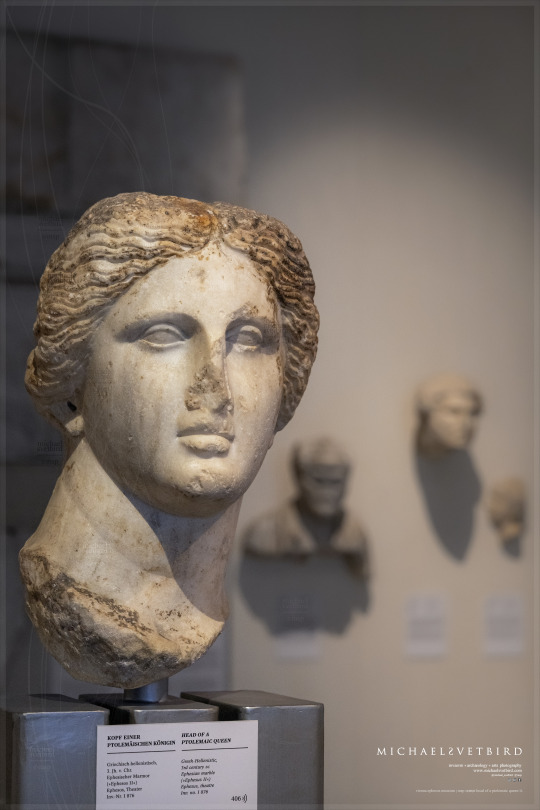
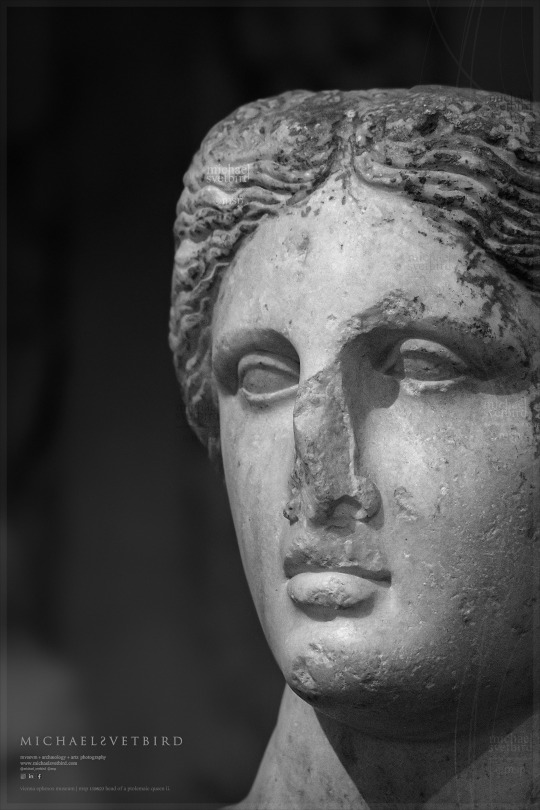
HEAD of a Ptolemaic Queen:
Greek-Hellenistic from Ephesus [theatre]
Ephesian marble
3 BC.
"The larger than life-sized head of a woman was originally inserted into the statue of a cloaked figure.
Traces of workmanship on the back of the head and the neck are often found on Hellenistic sculpture…
…Traces of a tiara identify the sitter as a Hellenistic [presumably Ptolemaic] queen, possibly Arsinoe III Philopator, Queen of Egypt [246-204 BC]."
[Txt ©EMV KHM, Vienna]
Ephesos Museum, Vienna | EMV KHM
• Web : https://www.khm.at/en/visit/collections/ephesos-museum
• FB : https://www.facebook.com/KHMWien
• IG : @kunsthistorischesmuseumvienna
EMV KHM | Michael Svetbird phs©msp | 13|08|23 6300X4200 600 [I.,II.]
The photographed object is collection item of EMV KHM, photos are subject to copyrights.
[non commercial use | sorry for the watermarks]
📸 Part of the "HEADS.Sculpture" MSP Online Photo-gallery:
👉 D-ART:
https://www.deviantart.com/svetbird1234/gallery/78520831/heads-sculpture
👉 FB Album:
https://www.facebook.com/media/set?set=a.1400262423675664&type=3
.
#vienna#ephesus#ephesos#museum#archaeological museum#kunsthistorisches museum#kunsthistorisches museum wien#hellenistic#ptolemaic#ancient greece#ancient sculpture#sculpture#ancient art#head#heads#queen#arsinoe#antiquity#ancient#archaeology#heritage#museology#art history#antiquities#photo gallery#art photography#archaeology photography#sculpture photography#museum photography#michaelsvetbird
2 notes
·
View notes
Text
Daenerys and Cleopatra ~ the last Targaryen queen and the last Ptolemaic queen of Egypt
Some Daenerys/Cleopatra parallels in my blog?, it's more likely than you'd think.
We can thank @sansaissteel for this one, because she was the one who told me, no middle terms, ‘I wanna see you do a Daenerys-Cleopatra one’; and since I aim to please — here I am, with a Daenerys and Cleopatra parallels meta.
As always a series of important premises before we hop on, I know I sound repetitive, but I believe them important.
I don't assume neither pretend to be in anyway an expert on the figure of either Cleopatra or Daenerys, as the first is a real, historical figure whose possible real identity has been tainted and influenced not only by the roman propaganda previous to her defeat, but the one that occurred following her defeat and death, and centuries after that as her figure has been object of mock and shaping to serve the purpose of fulfilling the role of seductress and sorceress already widespread by the roman propaganda; [I'll probably deepen a bit this bit later on the post, because I think that something of the sort might happen in asoiaf to Daenerys as well — not by saying things untrue per se but by putting them in a different light than Daenerys sees them to be, acting on a ruthless propaganda that will probably continue after her death — as the show hinted at us.] and the latter is a character for which we have one ending, and the events the author will have leading to this event might change or shift some of the consideration we make on her.
Nonetheless I feel like by taking into account the show and some textual evidence, we might make educated guesses on, at least, some aspects of her final act.
Secondly, our interpretation of these figures is influenced by the many layers that compose their identity not to them but to us and the way they are seen by us, in no way do I try to deliver some kind of holy truth with this, I only collect information due research and my own personal classical studies in high school. Our perception of these figures might different based on our education and personal convictions — and I do not mean in any way or form that those that do not agree with me are uneducated, if anything I am suggesting the fact that all of us are a product of the environment we grew up inside of and of the way certain traits speak more to us based on our own perception which is born of the education we have received by our environment and the life we have led up until now — so in no way this should be taken as some attempt to disclose one single, pure truth about either the historical figure and the fictional character.
Thirdly, as I am in no way an expert, if anyone actually is please come forward and share your opinion, and let's transform this in an occasion to learn more.
Said so, let's hop onto this train and see where it leads us, shall we?
THE ASP AND THE DRAGON; Cleopatra Thea Philopator and Daenerys Stormborn Targaryen; The last ptolemaic queen and the last Targaryen queen confronted.


Cleopatra and Daenerys with their handmaiden, I chose these two pieces because as soon as I saw the book compliant Daenerys one, with her short blond hair and her crown and her handmaiden I remembered this piece by Frederic Arthur, Cleopatra on the terraces of Philae (which again, Daenerys in her garden upon the peak of pyramid where she feels like a God— you get my drift, don't you?), as always credit to the artists for their gorgeous pieces.
Besides the iconography which is unbelievably similar, many of their traits coincide. Can the history of Cleopatra and her fall tell us more on Daenerys end?
Let's start by a bit of history of the family of which Cleopatra and Daenerys are the last heiresses and queens.
THE PTOLEMAIC DYNASTY vs. THE TARGARYEN DYNASTY


Queen of Alexandria and all of Egypt vs Queen of Meereen and the Bay of Dragons, claimant to the Seven Kingdoms
Cleopatra was the last heiress of the Ptolemaic dynasty of Egypt, a Macedonian dynasty who had taken control of Egypt after the death of Alexander the Great in 323 BCE, and they ruled over Egypt for almost tree centuries (293 years), up until the final annexation by Rome in 30BCE.
Now, House Targaryen ruled over the 7K for roughly 283years though we should add at least two years (roughly) before Aegon's coronation, (we're talking of the wars of conquest which went from 2-1 before A.C. and ended in 13 after the conquest when Rhaenys died). The dates are extremely similar, especially if we consider that the events of Asoiaf happen around 298 AC, I mean— we do see the similarity don't we?
And Daenerys is its last heiress.
Another similarity can be found in the fact that the Ptolemaic dynasty was a dynasty of foreign invaders coming from the east of Egypt, white invaders, just like the Targaryen were valyrians (thus came from the east, as Dragonstone was the western post of the Valyrian Freehold) and invaded Westeros from Dragonstone (which'll end up being the eastern post of Westeros before the Narrow Sea).
The Ptolemaic dynasty takes its name from Ptolemy Soter who was one of Alexander's commanders and generals and who survived him and was awarded at the king's death Egypt as his own domain and who declared himself pharaoh of Egypt kind of like Aegon the Conqueror declared himself rightful king of the 7K of Westeros even though he had no right no them.
In the time between the death of Alexander (323 BCE) and the time in which Ptolemy managed to stabilise his hold on Egypt as its sole ruler almost twenty years had passed (as the date of the actual begin of the Ptolemaic sovereign on Egypt is dated 305 BCE) and, while to stabilise his reign Ptolemy absorbed traits of the Egyptian culture his dynasty would have to face rebellion and civil wars from their subjects, the local, the egyptians also because his dynasty implemented the Egyptian culture with their own, the hellenistic, to the point that it is said that Cleopatra was the only one in her family who bothered to learn Egyptian as while they claimed to be successors of the pharaohs they remained barricaded in their culture, which they believed superior to the egyptians.
The strength of the ptolemaic Egypt was the grain, as Egypt was considered as the granary of the ancient world and the ptolemaic dynasty took complete advantage of this, not only in foreign politics, but also thanks to a closed-off economy for which inside the borders of Egypt only the Egyptian coin could be used, and considering the foreign coins could have up to the 17% more of silver the change from the foreign coin to the local one brought great advantages to the dynasty, enriching it.
Look at this — ☝🏽 — and tell me it doesn't remind you of the politics of Daenerys in Meereen, of her attempts to enrich Meereen and stave off the economical collapse using agriculture and taking profit, enriching her coffers for her future campaigns, from the ‘taxation’ of slavery.
The Ptolemys took to the Egyptian custom of intermarriages between siblings to keep the line pure and to have brother and sister ruling together as an unit over the throne (tho that didn't stop from inner-wars between siblings — just look at Cleopatra, Ptolemy XIII and Arisinoe — kind of like the wars between Targaryens and Blackfyres and the Dance of Dragons); in the same way as the Targaryens preferred marriages usually between themselves, or other families of Valyrian descent (barred some isolated cases) to keep the dynasty pure.
So, so far we have these similarities:
Both dynasties are of white, foreign invaders and have faced rebellions by the locals;
Both dynasties have ruled for roughly three centuries (decade più decade meno);
Both dynasties practiced intermarriages between siblings to keep the line pure;
the Ptolemaic dynasty strength resides in their grain and their closed-off economy —› compare it with Daenerys politics in Meereen (try to use agriculture to avoid the economic collapse after the dismantling of the first source of income of rich, slavery — and later reinstating slavery and taxing it with a closed-off structure to fund her campaign and fill her coffers)
Both dynasties rise themselves to the status of god-like.
And, Daenerys and Cleopatra are the last heiresses of these dynasties, both embracing their identity as a Ptolemy one and a Targaryen the other, both intent and determined to prove themselves and restore their dynasty to the previous glory.
I am blood of the dragon, she told herself. I amDaenerys Stormborn, Princess of Dragonstone, of the blood and seed of Aegon the Conqueror.
— Daenerys II, AGOT
“I know what Aegon proved. I mean to prove a few things of my own”
— Daenerys III, ASOS
‘Dany had no wish to reduce King's Landing to a blackened ruin full of unquiet ghosts. She had supped enough on tears. I want to make my kingdom beautiful, to fill it with fat men and pretty maids and laughing children. I want my people to smile when they see me ride by, the way Viserys said they smiled for my father. But before she could do that she must conquer.’
— Daenerys II, ACOK
And now that we've had a light infarinatura (smattering) on who were the Ptolemys and their politics, let's see the figures of Cleopatra and Daenerys, arguably among the most famous of each dynasty.
FROM QUEEN CONSORT TO QUEEN REGNANT

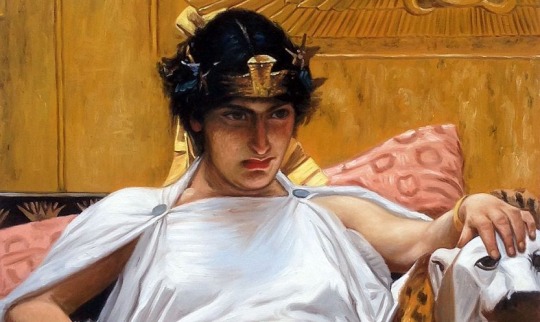
First thing first, both Daenerys and Cleopatra had various siblings (Daenerys a child of three — tho I still maintain there was something fishy in all Aerys giving all of that gold to the twins as a present for their birth just like the Targaryens did for their illegitimate children) and when their father dies they are supposed to succeed him as consort to their brother.
In fact when AGOT begins Daenerys was still convinced she was supposed to be Viserys queen and wife, that once she would flower he would wed her as she was the only suitable prospect for him as a wife and queen; at the death of her father Cleopatra marries her brother, Ptolemy XIII, and becomes queen consort of Egypt, though by being older than him for almost a decade she's the one effectively ruling, though formally Ptolemy is the king and she his consort.
The appearance and character of the two also comes into mind, both are described to be beautiful, charming and seducing, funny and entertaining as well as clever and witty. But I will digress on this a bit later.
What happens is this, Ptolemy exiles his sister, Cleopatra, in Syria, banning her from court, as the court was hostile against her, where she gathers an army of mecenaries to retake the throne of Egypt.
Daenerys is exiled in the east, sold by her brother for an army of mercenaries (who he bought by selling her as a spouse for their commander) and when her husband and brother both dies she's left alone with three dragons which are potential weapons, but she'll have to wait years before she can use them to take back her throne. So she is essentially isolated and exiled east, with assassins at her back, and with a wish to retake the throne she believes hers by right.
Sounds similar doesn't it?
Just as Cleopatra did not wait idly for some knight to come and conquer back her claim for her, neither does Daenerys and while she waits for her dragons to grow she begins a campaign east to gather resources, riches and an army to accompany the dragons. Her goal remains taking back the throne. What does she gather then?
Progressively she gathers a mercenary army loyal to her (Astapor), manpower and following (Yunkai), riches and ships (Meereen).
Now, Cleopatra did not wait idly, and once gathered her army she took advantage of the roman civil war, which front had expanded to Egypt, to gather a new ally. Cesar.
In fact, meanwhile Cleopatra had been preparing herself to fight her way back to the throne from which she had been sent off, Cesare had fought against Pompey, who had sought refuge in Egypt at the court of Ptolemy XIII.
Ptolemy, probably aided by his councillors and his sister Arsinoe (who will be Cleopatra rival for a time, and who was her half-sister, as they shared the father but not the mother — @sansaissteel imagine if Cersei ended up being Aerys' kid 👀) decides to hand as a peace offering to the most ruthless military leader of Rome the head of his enemy on a silver platter, thus he kills Pompey and gives Cesar his head as a welcoming gift.
Cesar was not impressed. Pompey was his enemy, but he was still a roman and betraying him and killing him this was an unbefitting end — especially since Cesar was a firm fautor of the latin clementia to his enemies — for a roman general, what Cesar decidedly was impressed with, was Cleopatra. The Egyptian exiled queen, in fact, managed to slither her way back to the capital and to meet Cesar privately seducing him at which point Cesar used his influence to try and pacify the two siblings. Ptolemy XIII rebelled to this attempt and with his sister Arsinoe of military pushing back Cesar and Cleopatra forces, which fails, Arsinoe flees and tries to gather new troops (things she finds easily since the egyptians were hostile toward Cleopatra and Cesar) while Cesar puts Cleopatra back on the throne with her brother, Ptolemy XIV (as Ptolemy XIII dies by drowning in the Nile) and entertains with her a romantic relationship to the point he allegedly fathers a child from her, Cesarion.
But, before any of this happened, or meanwhile, Cleopatra had to face the rebellion led by her half sister Arsinoe (born of a different mother) who had the support of the locals and of the army, but who was defeated by Cesar and led in triumph to Rome, only her young age saved her from execution and Cesar sent her to a temple where she allegedly spent the rest of her life afraid her Cleopatra's retaliation. —› if Cersei ends up being exposed as Aerys' kid (or moral heir) they would also fit this trope.
Then Cleopatra leaves Egypt to go to Rome with Cesar and live as his concubine, royal that she was, with him in Rome, where he was the wealthiest, most influent man of the Republic, hoping to become the kind of First Lady of Rome to put her son on a shared throne of the lands of Rome and Egypt.
In a similar manner, after Daenerys loses her brother (whom she already was thinking of dethroning, or put her son forward before his possible heirs) and her husband and child, and gains her dragons she starts a campaign in her own right as queen claimant of the Iron throne.
She starts in exile with a campaign east to gather the resources she would need to invade and take back Westeros, not only she charms Xaro in Qart, making of him one of her supporters, she continues furthers, she gains an army of slaves in Astapor (an army she does not free, but I am digressing) and following and manpower in Yunkai (as well as starting her own propaganda, by demonstrating a few things herself, as she states in Astapor), lastly she heads to Meereen and there she gathers a mercenary army (under the lead of Daario Naharis), riches and with them the funds, she hopes, to move west.
She chooses to remain in Meereen as queen regnant as she gathers more resources, and in a way to prove out of any reasonable doubt her worth as a ruler, by ruling over the freedmen and freemen alike.
Having disassembled the main source of income of the Slavers' Bay, Daenerys needs to find new incomes to avoid the collapse of Meereen especially when the government she has put in place collapse and the other cities fall back in their previous ways leaving Meereen isolated economically and physically due the embargo and the ship blockade as well as the mercenaries armies stationed outside of the city and the pestilence spreading in the city.
Daenerys' court in Meereen is full of vipers, Hizdahr (whom she is forced to marry to stabilise her rule and avoid a full-civil war) is no better than a lobbyist in the books, and he is far away from his show counterpart, and the environment is hostile towards her from the noble families a previous leaders of the city; this is in part due her revolutionary policies (abolishing slavery, upon which these people build their riches is revolutionary), in part due her methods (she crucified 163 freemen without any form of trial or judgment being passed, choosing them randomly — and I've already digressed on why it's vengeance and not justice, as justice would've been to have trials and investigations, but if she wanted to be quick, it would've been more ‘just’ for the time's standard to crucify the masters who had given their child-slaves up for crucifixion; remember, investigations before a trial is something done since Ancient Rome, and Daenerys and her story are set around Middle Ages Europe, so it's not far-fetched to expect for her to do something more juridicial than what she did — and she takes as cupbearers hostages the children of the main families to keep them in line), in part due the heritage she's so proud of (the cities of Slavers' Bay were founded by ghiscari, and Ghis and Old Valyria were the equivalent of Cartage and Rome), in part due to her gender (misogyny is an important matter in asoiaf, not because the story itself is misogynist but because the society that it depicts was).
It's a situation not so different from the one Cleopatra had to face in her own court. An hostile court within her own hostile reign, a reign she took both military and also without rising a physical finger, much like Cleopatra did allying with Cesar, Daenerys ends up — while being still loved by her freedmen (tho that might change when she returns after having fled Meereen on dragon back if her people felt abandoned, which would be an interesting layer to add, because common people end up blaming their ruler for even those calamities which are out of their hands, like the Egyptians blaming Cleopatra for the unreliable Nile's floods) — being surrounded by hostile counsellors she doesn't know if she can trust, and counsellors whose capacities lay elsewhere (Barristan is mostly a knight, and he is a bit fickle with his loyalty. He would have sworn for Joffrey had Joffrey not humiliated him — but that was Varys' plan all along, to provoke the old knight's pride to send him to Aegon's aide, tho he ends up in Daenerys' entourage), betrayed by those she held in high esteem (Jorah) and essentially a young girl fitting shoes almost too big for her with dreams of love unperturbed by the day-to-day politics of ruling, a determined young woman, intent on bringing glory to her House and avenge her family and right to the throne.
‘I mean to sail to Westeros, and drink the wine of vengeance from the skull of the Usurper.’ —Daenerys III, ACOK
Exactly like Cleopatra, Daenerys is a queen in her own right, (while Cleopatra had her son as co-regent, so never ruling formally alone), Daenerys is the sole head of her entourage, which has a pyramidal structure (much like the ancient Egyptian society), but without a bureaucratic system put in place to resolve the matters that can also be not taken directly to her, which ends being inefficient. Her court is hostile to her, despite her trying to adapt their customs and this is were the two figures actually start to almost coincide, but I will digress on this later. She is, all in all, an hellenistic absolute ruler, a god-like ruler, her figure is object of veneration by her freedmen, they hail her Mhysa, I will return to this later as well.
Mhysa which means mother, similarly Cleopatra had her own form of propaganda with the indigenous people of Egypt, by portraying herself and her son as Isis and Horus on earth, thus creating a personal cult of the Mother-and-the-son-of-myth.
Problem was, the romans were steadfastly against the very idea of the absolute hellenistic ruler of which Cleopatra, de facto queen regnant of Egypt, was a prime example. Problem is, the westerosi are steadfastly against the idea of an absolute ruler, they are based on middle aged England, and the very idea of an absolute king is preposterous for them. The ruler is supposed to be a Primus inter pares, someone who rules them, yes, someone who has right of life and death on them, but they have proved that if those death are unjust and they disagree they will rebel — remember? What actually spiked the rebellion was not Lyanna's abduction, that was the pretence, the real event that spiked the Rebellion was Aerys murdering Rickard and Brandon and his next move to demand the head of Robert and Ned as well. Yes, the king is the king, but the lords are not subject to his every whim, they will push back.
A very important point to add to this last consideration about romans disliking the very idea of the hellenistic ruler is that while that might seem foolish and incorrect since Octavian — Cesar's heir — was de facto the first roman emperor, it's actually true. In fact while we call the time that goes (roughly) after Octavian definite ascension as sole leader of Rome as ‘Roman Empire’ especially in for the first ‘emperor’ the correct term is that of principato (princedom) as Octavian and his heirs proposed themselves as Primus inter pares (first between equals) and as guarantor of the morals and values of the Republic, it was only after that they became more like the hellenistic ruler the romans of Cleopatra's time disliked so much.
So, the romans, were afraid that Cleopatra would influence Cesar to become that kind of hellenistic ruler. Rome had already had the so called homo fors (strong man) to which they awarded the imperium as a dictator (but it was a short-term solution) because romans believed that power should be in the hands of only a man only when the situation was so stringent and urgent to demand it. Fear that became reality when Cesar used his wealth and influence to force the Senate to name him dictator for life. The next logical step everyone was waiting for was for him to make this new dictatorship inheritable, and fearful because the people (common) loved Cesar so much they would've accepted it, the Senators decided to kill him and actually did at the idis of March of 44 BCE.
At that point Cleopatra had no real ally in Rome, and the death of Cesar meant she was unwelcome, and her son, Cesar's formally unrecognised son — her son — could be in peril thus she fled back to Egypt.
Once returned to Egypt soon enough her brother and co-regent Ptolemy XIV was killed — some say by her own agents — and Cleopatra remained the sole queen regnant of Egypt, while formally her son, Cesarion, ascended as Ptolemy XV and as her co-regent.
For the first time, now, Cleopatra's hold on the throne of Egypt was strong and unshakable, still, she had not accounted for the floods of the Nile being unreliable and the disaster that caused for the economy and for the people (who already disliked her, for she was philo-roman), as I told you before, in those times, as now (if now a little less) people ended up blaming their rulers even for cataclysms or things that were out of their control (the floods of the Nile, the pestilence in Meereen) so it wouldn't surprise me if the people of Meereen would happen to be disillusioned by their Mhysa once she finally manages to return home after all they suffered while she was away, but that is yet the realm of hypothesis as the books are not out yet, and there it'll stay.
Daenerys in Meereen is facing the hardships of ruling over a city with two souls, the freedmen who venerate her as Mhysa and saviour, and the freemen/exslavers who see her as a conqueror and nothing more, she tries to make the city thrive despite loosing its first source of income, she tries with agriculture and commerce, but she has to face retaliation from the opposite faction which is re-organising and doesn't mean to let go of their power so easily. The conditions end up being so bad, her freedmen come to plead with her to reinstate slavery so that they can re-sell themselves into slavery and her reply is to accept that and tax it, but instead of choosing to use that tax to implement the condition of the city (thus accepting any kind of goods) she uses a completely closed-off economy and demands payment only in gold and gemstones, the kind of wealth that can help fund her campaign west.
But what happens in real history after Cesar' murder?
Meanwhile civil war had spiked again in Rome, the factions being the previous allies of Cesar (his heir, Octavian; his legatus Mark Anthony and Lepidus) and his assassin (Brutus and Cassio) and both factions asked for her support. In the end Cleopatra decided to send her support to the triumvirate which defeated the assassins at the Battle of Philippi.
After that Octavian and Mark Anthony split the territories of Rome (poor Lepidus was just caught in between and got what was left) and Mark Anthony summoned Cleopatra to Tarsus. She went willingly and seduced him, she charmed him and he fathered by her two children (twins — boy and girl) to then leave her to return to his lawful wife and children in Rome.
The relation between Octavian and Mark Anthony were strained and to avoid another civil war Mark Anthony was forced to marry (after his third wife died) Octavian favoured (half)sister Octavia; yet Rome was growing and at one point, in 37 BCE Mark Anthony met with Cleopatra again to obtain funds and support for his war against Parthia and she negotiated to get back much of the eastern lands that had once belonged to Egypt.
—› this is apparently the route D&D went with, with the show. Jon would be the Mark Anthony of the moment, who, desperate for help by the eastern queen promises her back lands that do not belong to her anymore (the North) to then become something akin to her prime consort, putting aside all previous relations (the Starks). Spoiler alert: it didn't work.
They became lovers again, and soon enough Mark Anthony fathered another child by her (after the twins) and after the resounding defeat he was delivered in Parthia, he decided to publicly set aside his wife, Octavia, and become Cleopatra's husband and prince consort.
Cleopatra convinced him to declare publicly her son, Cesarion, as Cesar's true and rightful heir (despite him being anything but) and Mark Anthony granted to each of their children lands that belonged formally to Rome, acting thus exactly like an hellenistic ruler, bringing to life the fear that had led the Senate to conjure against Cesar in 44 BCE.
At this point Octavian — Cesar' chosen and designed heir — had not only managed to strengthen his position in Rome (he had also married Livia, who previously had been the wife of one of his oppositors managing to bring together the two factions, and with whom he fell in love, remaining faithful to her for all of his life, a long life, reinforcing this idea of him as a guarantor of the old morals), appearing as Cesar's moral heir to the populares and as guarantor of the morals of Rome to the whole republic started a ruthless campaign against Cleopatra.
Mysoginy?
Yes but not only. Cleopatra was an easier target of his ruthless campaign of propaganda, than Mark Anthony, not only for her gender (tho that played a part as well) but because she was foreign and it would have been easier to provoke the Senate and people against a foreign than against a roman legatus, she and her eastern ways were figure of mock for the romans — the fact that she had persuaded/seduced Mark Anthony to pay homage to foreign gods and act like an hellenistic ruler when in fact his first duty should've been to Rome much easier to swallow than his ambition taking the highest road and severing him from his duty to Rome — and would've made his quest against her and Mark Anthony as no longer a roman, much easier to swallow for the people of Rome.
But before diving in the this last section of this meta, let's first see exactly, beyond the story, the parallels between these queens; this has turned extremely long, and — in my defence — I was left unsupervised after @sansaissteel unleashed me on Tumblr.
CHARMING, WITTY, FUNNY AND BEAUTIFUL, A SEDUCTRESS, AND A FEMME FATALE, RUTHLESS AND DETERMINED, A RULER AS CAPABLE, OR INCAPABLE AS ANY OTHER MAN (it's not a matter of misogyny it's a matter of equality)

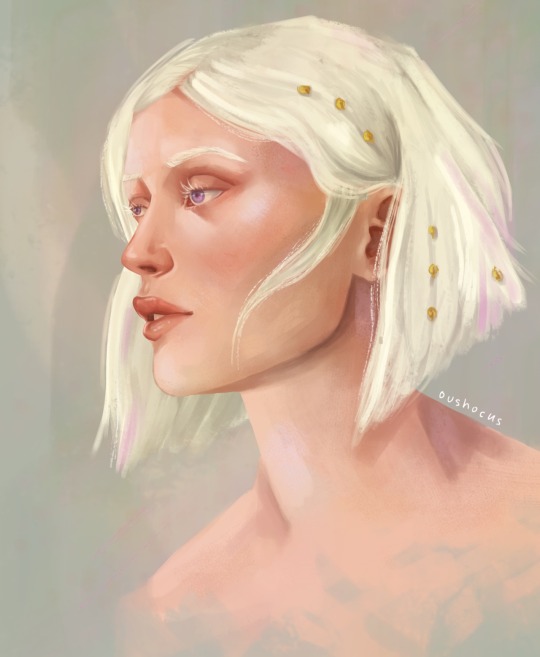
Another two gorgeous pieces, here we see a very Egyptian looking Cleopatra, an hellenistic ruler who did her best to adapt to the Egyptian customs while trying to bring her dynasty back to glory; and Daenerys Targaryen with the bells in her hair as the Dothraki leader she is.
Now, we have seen how the stories of these two queens seem to shadow each other, and in some point even coincide, but let's break down, point by point, the similarities between these two queens, the way they are viewed and they way the view themselves.
Sorry if some points will sound redundant, but it's needed to tie everything together.
Let's start by the simplest:
both of them are foreign queens coming from a dynasty of ‘white’ invaders, who have conquered the power they have military first and politically later.
Cleopatra comes from the Macedonian dynasty of the Ptolemys who aided Alexander the Great in invading and conquering Egypt, and she, herself, to whom both the people and the court were hostile, took back her right to the throne by fighting with an army of mercenaries and striking alliances with foreign invaders (Cesar) —› Daenerys comes from the Targaryen dynasty, a dynasty of Valyrian refugees who took the 7K with a military campaign, who were overthrown and she, exiled east as Cleopatra had been by her own brother, gathers an army made of mercenaries (and Unsullied) to take back the throne she perceives as belonging to her. The Ptolemys were foreign for the indigenous egyptian while Targaryens were foreign both to the westerosi and to the essosi.
both of their dynasties rule over their kingdom for roughly three hundred years (their tenure as queens claimant/regnant included)
The Ptolemy hold on Egypt went from 323 BCE to 30 BCE, 293 years, —› while AGOT starts in 298 AC, 298 years after the coronation of Aegon the conqueror.
both of them come from incestous relationship, as both their dynasties practiced intermarriages to keep the bloodline pure and have brother and sister marry and rule together.
Cleopatra is the daughter of Ptolemy XII and his sister-wife, and had several half-siblings (one of them, Arisonoe, tried to overrule her as queen with the help of their brother Ptolemy XIII, but failed her military campaign and was brought in triumph at Rome, to then find sanctuary in a temple and be killed on order of Cleopatra) —› Daenerys is ‘the last dragon’ and the daughter of Aerys II and his sister-wife Rhaella, she has several siblings (two brothers, and her mother had several stillbirths).
—› Arsinoe's role, in asoiaf, could be fulfilled by Cersei, who if not Aerys' kid, is without doubt his moral heir (just think on when she burns the Tower of the Hand and is aroused by the sight of wildfire, reminding her brother Jaime of Aerys) —› also if the twins ends up being Targaryens bastards (like some evidence would have) Jaime would easily fulfil the role of Ptolemy XIII who tried to keep Cleopatra away from the throne by siding with his sister, Arsinoe.
Both of them are described as beautiful and charming, full of allure as well.
Of Cleopatra some of the fonts we have, tell us this:
(...) she was a woman of surpassing beauty, and at that time, when she was in the prime of her youth, she was most striking; she also possessed a most charming voice and a knowledge of how to make herself agreeable to every one. Being brilliant to look upon and to listen to, with the power to subjugate every one, even a love-sated man already past his prime, she thought that it would be in keeping with her rôle to meet Caesar, and she reposed in her beauty all her claims to the throne.
— Dio, Roman history (XLII)
(...) her tongue, like an instrument of many strings, she could readily turn to whatever language she pleased.
— Life of Anthony, XVII
(...) a woman who was haughty and astonishingly proud in the matter of beauty.
— Life of Anthony, LXXIII
Appian remarks on the "beautiful image of Cleopatra by the side of the goddess" (II.102) in the Temple of Venus Genetrix, and Antony being "amazed at her wit as well as her good looks" (V.1.8) —› if we think Daenerys is associated with the eastern Venuses, like Astarte and Ishtar and Inanna this hits closer to home than I had at first expected.
Her beauty is considered as harmful as the beauty of Helen of Troy, only, instead of being harmful to the trojans it was harmful to the romans (who, btw, claimed descent from the Trojan prince Aeneas) instigating civil war between Octavian and Mark Anthony (on this point I will return later, bear with me)
—› Daenerys, instead, is described as a lovely teen, slender of frame and with the beautiful traits of old Valyria, pale skin and purple eyes, silver-gold tresses, fair and beautiful.
"I... that was not fitting. I am your queen."
"My queen," he said, "and the bravest, sweetest, and most beautiful woman I have ever seen. Daenerys—"
��� Daenerys I, ASOS
(...) And now the most beautiful woman in the world was waiting in Meereen, and he meant to do his duty and claim her for his bride.
— The Merchant's man, ADWD
She was no stranger to the overblown courtesies of Qarth. "If you are drunk, blame the wine."
"No wine is half so intoxicating as your beauty. My manse has seemed as empty as a tomb since Daenerys departed, and all the pleasures of the Queen of Cities have been as ashes in my mouth. Why did you abandon me?"
— Daenerys III, ADWD
—› this association of her beauty being more intoxicating than any wine, is actually another nudge to Cleopatra, who seduced Mark Anthony in the span of a series of encounters which later would become a routinely date by the name of “the Inimitable Livers” as they founded their own wine-club.
Also, Cleopatra was described not only as beautiful, but as charming and witty, many in fact, commented on how her beauty was not striking enough alone to seduce all men, but her wit and her charm and her silver-tongue would do the rest. Daenerys herself is witty and often funny, she is still a girl, and sometimes she shows her young age with teasing and japes.
"Ser Barristan," she called, "I know what quality a king needs most."
"Courage, Your Grace?"
"Cheeks like iron," she teased. "All I do is sit."
— Daenerys I, ADWD
Now let's hop onto the ones who are more shady, as what we know of Cleopatra has been heavily influenced by the way the romans saw her (which, in turn, was a product of Octavian propaganda and campaign against her), while what we see of Daenerys is mostly what she and those closer to her (and on her good side) see. So, in both cases, the opinion is not devoid of bias.
Just as Cleopatra Daenerys is very clever, outsmarting the slavers in Astapor and the mercenary, she's also ruthless and not afraid of getting her hands dirty. Just think of the way she first agreed to the price of the Astapori'i for the Unsullied and then went back on her word once the deal was made (and she made sure to get informations about how the Unsullied's mind worked before she decided how to move to collect them as army and make sure they were loyal only to her, for she is afraid that once she's done with them and sells them they would be used against her) or the way she outsmarted the mercenaries by giving them until dawn to think, and attacking them by night. She ain't afraid of playing dirty to get what she wants, that's for sure. And Cleopatra wasn't either.
Cleopatra, sent from her court by her brother, the rightful ruler by law, decided she cared not that her brother was king, she was equally worthy of being queen, she was the queen of Egypt and she would fight her way back to the throne. She started a civil war thanks to the mercenaries armies she gathered and outsmarted Ptolemy and Arisinoe by convincing Cesar to side with her, by slithering her way back to the palace and seducing him (kinds of remind me both of Daario changing sides because he is charmed by her beauty and her managing to take Meereen by seducing the fighting slaves in Meereen with the prospect of freedom tbh).
Cleopatra didn't care about the roman custom of the pater to name his own heir by law, she didn't care her son actually had no lawful ground to be recognised as Cesar's heir, she wanted to put her son to the throne and she moved for it, completely disregarding, the not so little detail that by naming an heir Cesar had definitely put Cesarion out of the picture to inherit from him. In the same way, while proclaiming Viserys as her king, Daenerys has no qualms about planning of putting her son by Drogo on the Iron throne (disregarding the fact that Viserys, if he ever got to sit on the Iron throne would then marry and have children, heirs to his throne, and thus Rhaego would be out of the picture).
And sometimes she found herself wishing her father had been protected by such men. In the songs, the white knights of the Kingsguard were ever noble, valiant, and true, and yet King Aerys had been murdered by one of them, the handsome boy they now called the Kingslayer, and a second, Ser Barristan the Bold, had gone over to the Usurper. She wondered if all men were as false in the Seven Kingdoms. When her son sat the Iron Throne, she would see that he had bloodriders of his own to protect him against treachery in his Kingsguard.
— Daenerys IV, AGOT
—› notice the use of ‘when’ instead of ‘if’ very confident, there and in all of this, Viserys is still very much alive, and will die next chapter, so she is effectively planning to put her son on the throne she said belongs to her brother, as in Daenerys V, she still claims Viserys is her brother and her king and that if he wanted the eggs he only needed to ask, yet, in Daenerys IV she already believes her son will be the one to sit on the Iron throne, after Viserys or in this place is not clear, thus disregarding either Viserys ‘claim’ she believes in and any possible heirs he might father if he ever takes the Iron throne.
This is a very bold move which reminds me of Cleopatra disregarding Cesar' will naming Octavian his heir to find the way to put Cesarion in his father's place at the head of Rome and one day king of joint Rome and Egypt.
(...)
Daenerys had gone cold all over. "He says you shall have a splendid golden crown that men shall tremble to behold."
Viserys smiled and lowered his sword. That was the saddest thing, the thing that tore at her afterward … the way he smiled.
"That was all I wanted," he said. "What was promised."
When the sun of her life reached her, Dany slid an arm around his waist. The khal said a word, and his bloodriders leapt forward.
— Daenerys V, AGOT
The khal’s mouth twisted in a frown beneath the droop of his long mustachio. “The stallion who mounts the world has no need of iron chairs.”
Dany propped herself on an elbow to look up at him, so tall and magnificent. She loved his hair especially. It had never been cut; he had never known defeat. “It was prophesied that the stallion will ride to the ends of the earth,” she said.
“The earth ends at the black salt sea,” Drogo answered at once. He wet a cloth in a basin of warm water to wipe the sweat and oil from his skin. “No horse can cross the poison water.”
“In the Free Cities, there are ships by the thousand,” Dany told him, as she had told him before. “Wooden horses with a hundred legs, that fly across the sea on wings full of wind.”
Khal Drogo did not want to hear it. “We will speak no more of wooden horses and iron chairs.” He dropped the cloth and began to dress. “This day I will go to the grass and hunt, woman wife,” he announced as he shrugged into a painted vest and buckled on a wide belt with heavy medallions of silver, gold, and bronze.
“Yes, my sun-and-stars,” Dany said. Drogo would take his bloodriders and ride in search of hrakkar, the great white lion of the plains. If they returned triumphant, her lord husband’s joy would be fierce, and he might be willing to hear her out.
Savage beasts he did not fear, nor any man who had ever drawn breath, but the sea was a different matter. To the Dothraki, water that a horse could not drink was something foul; the heaving grey-green plains of the ocean filled them with superstitious loathing. Drogo was a bolder man than the other horselords in half a hundred ways, she had found . . . but not in this. If only she could get him onto a ship . . .
— Daenerys VI, AGOT
—› look at this (☝🏽) at Daenerys broaching the subject after they've had sex, so he's spent and maybe more willing to listen to her, or to her thinking of trying again after he feels victorious for the hunt and tell me it doesn't remind you of the very idea of Cleopatra meeting Cesar in secret to convince him to side with her, or meeting Mark Anthony and seduce him to her side?
Another trait that seems to link these two women is them being able to speak more than one language. Cleopatra is told to be able to shift from one language to another without difficulty and she's said to know dozens of languages; Daenerys knows high valyrian and westeron, she learns quickly both Dothraki and old ghiscari which is a testament to the abilities of both women of being chameleon and adapting to their environment. Cleopatra is said to be the only one who bothered to learn egyptian and Daenerys was the only one, between her and Viserys, to bother to learn Dothraki and later she learns old ghiscari as it might aide her in governing.
both women adapts to their environment and adopts some of the customs of the people they are ruling over, Cleopatra keeps up the pretense of the inter-siblings marriages the Ptolemys had taken to (an egyptian custom) though she entertains not-incestous relationships and means to put her son, not born from an incestual relationship on the throne that thrived on it for three centuries (Daenerys wanting to put Drogo's son on the Iron throne the Targaryen sibling-spouses build); Daenerys adapts some of customs of the Dothraki (even after Drogo's death, when she is khaleesi in her own right, she keeps wearing blue and yellow which were Drogo's colours; and wears bells in her hair, since they aren't long enough to braid after they were burned in the pyre), she wears a tokar in Meereen to appease to the ghiscari sensibilities of her eastern court and keeps Hizdahr in her council despite his book-version being no better than a lobbyist, going as far as to marry him and re-opens the pits (another Meereenese custom —› tho, it must be said that she did that as another manoeuvre to gather riches in her coffers for the campaign west and secure the peace that would permit her to leave sooner for westeros).
both are capable of making very questionable decisions, Cleopatra has Arsinoe assassinated despite her not representing a threat to her rule anymore (and it is rumoured she had a hand in the death of both Ptolemy XIII and Ptolemy XIV as well); Daenerys does not differentiate between slavers and freemen when in Astapor and has them all killed, say nothing about the women and declares safe only under 12 boys (tho, it is said in the text that her army didn't seem care to stop and ask, to look at evidence, they would look at boy and go ‘yeah look like 13, die’ and be done with it, even if the kid was 11) she has the wine seller's daughter tortured in front of the father to gather from him information she isn't even sure he has, crucifies 163 random freemen for the 163 children (and I've already digressed as of how, with a few adjustments she could've delivered justice and how she didn't, so I won't digress on it further here).
Both Daenerys and Cleopatra are subject to and use the cult of veneration. Cleopatra makes sure she is portrayed and thus seen as Isis (which as I've explained in the mythology meta about Sansa Stark, x, was considered the epitome of egyptian queen mother) and her son, Cesarion, as Horus king and queen mother of Egypt, Daenerys is venerated by her people as Mhysa (mother) and one of her epithets is ‘Mother of dragons’ (might I remind you that Horus was a winged creature as well?) , and both identifies as such (Cleopatra meets Anthony dressed as Isis, and Daenerys has her whole titles recited every time, as well as considers herself mother of dragons, mother of monsters, even when it is a matter of monstrosity identifying herself with the dragons that she considers her children).
both Daenerys and Cleopatra are military leaders, Cleopatra led her fleet in battle and Daenerys (whose strength is also her fleet) would've led her forces in battle, had her commanders not convinced her otherwise; both end up being the exact opposite of the ideal of queendom the people they mean to rule over would have — military leaders, instead of a matron working in the shadow for Rome, and a queen wielding soft power for Westeros. As highlighted by this passage, her beauty (bells in the hair) take a dark connotation by meaning war and destruction:
“I dreamt a wolf howling in the rain, but no one heard his grief," the dwarf woman was saying. "I dreamt such a clangor I thought my head might burst, drums and horns and pipes and screams, but the saddest sound was the little bells. I dreamt of a maid at a feast with purple serpents in her hair, venom dripping from their fangs. And later I dreamt that maid again, slaying a savage giant in a castle built of snow.”
— Arya VIII, ASOS
I think the lonely wolf howling in the rain might be Arya, because “no one” hears his grief (and we know Sansa felt Jon's grief and death), we know the maid slaying the giant in a castle build of snow and with purple serpents in her hair is Sansa (respectively against Joffrey and LF). But what refers to Daenerys is this bit: ‘such a clangor I thought my head might burst, drums and horns and pipes and screams (Dothraki screamers, just saying), but the saddest sound was the little bells’.
The saddest part was the little bells.
The saddest part was the little bells.
The saddest part was the little bells.
The saddest part was the little bells.
Daenerys wears bells in her hair for her victories, and they cling in the wind as she moves... as she attacks kings landing won't the bells (connected to death and war and creation) be sounding?, those in her hair and those of the tower?
But, in truth, one of the points I believe to be key to the similarities between them resides on the fact that little is known of the true Cleopatra, all that is told about her comes from roman authors who write decades after her death and is, as I have already stated, heavily influenced by Octavian's propaganda against her; in the same way I believe Daenerys shall be subject of opposing propaganda as well, and indeed, she already is.
"Must?" Tyrion made a tsking sound. "That is not a word queens like to hear. You are her perfect prince, agreed, bright and bold and comely as any maid could wish. Daenerys Targaryen is no maid, however. She is the widow of a Dothraki khal, a mother of dragons and sacker of cities, Aegon the Conqueror with teats. She may not prove as willing as you wish."
— Tyrion VI, ADWD
“The frightened child who sheltered in my manse died on the Dothraki sea, and was reborn in blood and fire. This dragon queen who wears her name is a true Targaryen. When I sent ships to bring her home, she turned toward Slaver's Bay. In a short span of days she conquered Astapor, made Yunkai bend the knee, and sacked Meereen. Mantarys will be next, if she marches west along the old Valyrian roads. If she comes by sea, well … her fleet must take on food and water at Volantis.”
— Tyrion II, ADWD
Daenerys sees herself as a saviour and a liberator, a queen in her own right fighting her way back to the throne she thinks belong to her by right. But how do other see her?, as a sacker of cities, a conqueror and an unyielding khalees (which are all negatively connotated, a nasty woman who has power and won't be easy to bend to men's rule with a penchant for burning and sacking cities and enemies). This will only get worse with TWoW and ADoS.
As in the show, part of Daenerys' failings, despite her politics, was the fact that she played perfectly in the hands of the players around her.
Cersei used her policies east as a manner of propaganda, presenting her as this kind of hellenistic ruler/tyrant who'd act out of place in Westeros and has come to instigate civil war, what does Daenerys do?
She shows the Westeros Cersei is right, I have already spoken on how she broke the chivalry code (which was in place since William the Conqueror thus is something the Westeros version of middle age England would know and does know, as Robb keeps the Lannister's squires for ransom and he executes Karstark when he disobeys him and makes of him a betrayer of the code of chivalry) by burning the Tarlys instead that ransoming them or stripping them of their titles and send them to the Wall.
Sansa chirps the truth about her and Jon's to the right ears and points out how Jon is better suited as a ruler than Daenerys is, and what does Daenerys do?, she proves Sansa is right by disregarding Varys pleadings about Kings Landing, and instead of showing she is a good ruler, I don't know, by going to a conquered keep (Highgarden, Harrenhal, whenever else) and set up court and become the alternative to Cersei's iron-fist, she goes and burns Varys to suggest she takes the long route and does not burn KL and proceeds by burning the city and all the people inside.
All Cersei and Sansa said was the truth of Daenerys, merely seen from an outsider point of view, they do not see Daenerys try to make peace with the Meereenese, they see Daenerys crucifying random people without a trial (not even a mock one), they see Daenerys keeping hostages the kids of noble families in her court and they see her as a sacker of cities and a destabiliser of governments without the good outcome of having a better prospect to rise economy, in fact Daenerys fills her coffers with Meereen's riches because war have costs and they are won as much by weapons as they are by coin.
As I said before, it's not cleancut, just as Cleopatra was not only a seductress and temptress. But propaganda works that way, and peace be to Cersei she is not a better, more stabile prospect, but Sansa is backing a better, more stable prospect to the throne. Jon.
And Daenerys with her policies plays right into their hands and it's possible that the same will happen in the books. After all the game of thrones is exactly that, put the enemy in a bad light, and make sure you are viewed in the right light showing how you are better suited to rule. The difference between Daenerys and Cersei is that Daenerys wants the Iron throne as Cersei does, but Daenerys also has this dream of making her kingdom beautiful and love her, though she has proved, time after time, that violence works better than diplomacy (I already digressed on this), the difference with the Starks is more pronounced. Jon and Sansa's arcs are political and focused on the good of the people they are in charge of (just look at Sansa's whole arc in the Vale, on how she is trying to protect her cousin now that his mother is dead, and is trying to get him to be loved by his people by caring for them and make sure he is viewed as a suitable prospect, shaping him to become some; and look at Jon choosing the NW over Ygritte because of his duty to the North, and him choosing to let the wildling through the Wall because by having them fight together he has more possibility of saving Winterfell and the North), Bran's arc has always been about sacrificing for the good of those in his charge and Arya is learning to be justice instead of vengeance. The core difference is that Daenerys, as well as Cersei, see the throne as their right, the Starks see their “throne” as their duty first and their right after, which is why the Starks propaganda (coupled with Cersei and mayhap even Arianne and Aegon's) might work and corner Daenerys. And once cornered Daenerys goes Dothraki on her issues and resorts to violence, thus playing in their hands completely.
Why?, because they are right, in part; as power and politics is not a clean-cut matter. Even a tyrant might have good intentions and put in act good policies but in the wrong ways, or he/she might make good policies, but bad decisions on other more important matters.
Is Daenerys solely good?, is she solely evil? Neither.
Is Cersei? No.
Are the Starks? No.
It's all shades of grey, and the smarter shade of grey is the one who manages to stabilise its hold, care for its people and thus living and ruling long.
OCTAVIAN vs CLEOPATRA ~ SANSA vs DAENERYS a war of morals and politics

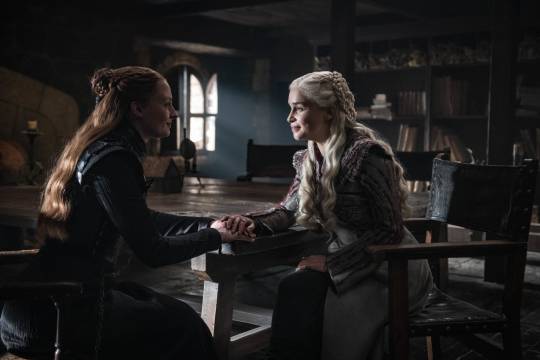
I mean — whoah guys, I had no intention of going in this direction until writing this long meta it kind of became obvious — here we have ‘Meeting between Cleopatra and Octavian after Antium’ by Luis Gauffier and on the right the infamous scene of the meeting between Daenerys and Sansa after Jaime's farce of a trial. I mean, even the visuals play their part to perfection.
So, when I started this meta, I already had in mind how it was supposed to end with Cleopatra being outwitted and defeated by Octavian, and tbh I thought that either Jon or Aegon would be Daenerys' Octavian, but as I was writing I realised how wrong I had been in that assumption. As I've said numerous times, I firmly believe that Martin has been pitting these two ladies against each other since book 1 (and I've spoken a bit about it here) as moral and political rivals.
Whereas Daenerys has been learning to rely mostly on herself and her dragons to resolve issues once she's backed into a corner, without the possibility of pushing back violently Sansa has had to learn the long, tortuous way that getting people to work together is a matter of art and patience as much as stitching (and it is not a chance that Sansa is first show being complimented on her stitchings, btw). By this I do not mean that Daenerys has not tried her hand to diplomacy, she has, but it has shown her nothing but that it fails, that it is too long to bear fruits and that the quickest and surest route to obtain what she wants is through violence and her dragons. It's what has been working for her better, no matter how hard she tried with diplomacy; Sansa has had not this possibility, she has learned to rely solely on diplomacy and her political skillset to survive, and she's apt at it too (as @elegantwoes was telling me the other day, her whole role in the creation of the Winged Knights and the Tourney of the Vale serves various political purposes — of which she means to talk about so I won't digress here — and it show us how subtly and diplomatically clever she has grown).
What more, I realised that Sansa fulfilled the Octavian role almost to perfection.
Octavian was Cesar's unlikely heir, he was young and untested when he inherits Cesar's will and place at the head of the family —› Sansa is an unlikely heir (though she is both the moral heir and factual heir of Ned, but I digress) apparent (as her younger brothers are both alive though presumed dead), young and untested when she ends up being the only Stark on the chessboard (Robb fulfils part of Cesar' role in her story).
Octavian played the part of the unsure, modest and willing to be guided youth, Sansa played the part of the little bird after Ned's death to survive when South.
Octavian had a duty to Cesar's veterans, as Cesar had demanded in his will and sold all of his properties to face those demands; Sansa has a duty to the North and to her people, and she's subtly manoeuvring to get back home, no matter that she has for a time to shed her Stark identity to hide as Alayne Stone.
Cicero, believing in Octavian's ploy of being easily manipulated, takes him under his tutelage and helps him gather enough influence by becoming consul of Rome (all the while Octavian has his father's enemies to still get rid of, Brutus and Cassius — Walder Frey and Roose Bolton), Littlefinger, believing Sansa to be easily manipulated, takes her under his tutelage and helps her gather influence by making her the de facto great lady of the Eyrie, a spot she is exploiting subtly to her advantage wielding the soft power learned from Catelyn.
Octavian obliterated thanks to Mark Anthony Cesar's enemies and split the lands of Rome with his allies outsmarting Cicero by coming out from his false identity of gullible youth and taking hold of Rome's Senate on his own and has Cicero killed (tho he was his mentor of sort), Sansa is foreshadowed to help her sibling through winter and against their enemies and also to bring forth LF's end (tho as shown by the show, she still uses his lessons as he was her mentor, in a way — I spoke of these matters at length already, x, xx, xxx, xxxx, xxxxx).
Octavian was de facto the emperor of Rome, yet he never consacred himself as such, rathering the title of princeps and guarantor of the romans morals, Sansa, in the same way is a princess in the north and is Ned's moral heir, thus a guarantor of the Stark's morals.
Octavian acted against Mark Anthony and Cleopatra first by the means of propaganda to then, attack military and reach his goal, similarly Sansa has done the same in the show, to defend Jon (the Mark Anthony of the moment) she used propaganda against Daenerys to then move in military to save her brother when he was imprisoned, reaching her goal by gaining independence for the North and securing Jon's life.
—› also Jon might play the role of Mark Anthony in the book too, but just like he was undercover with the wildling he might be a false Mark Anthony, who'd kill Daenerys (deal the final blow —› ‘love is poison’ Cleopatra allegedly died of poison and she was felled by love, the love Jon bears his family. And Sansa has many Cregan Stark parallels, one of which going South after the assassination of a king/queen and putting a child she supports on the throne (Bran) while taking back North a southern of the opposite faction (Jon, who outwardly supported Daenerys, but we know the book is building toward polJon). Btw, Octavian did something similar by marrying Livia, the wife of a man of the opposite faction (going as far as to adopt her son and make him his heir), a woman whom he loved until the end of his life, a wilful woman who lurked in the shadows and ruled next to both her husband and her son. If Jonsa does happen, Jon would have played the Mark Anthony to then end up being unmasked as a gender swapped Livia to Sansa's Octavian, and I am here for it, if it does happen.
Now, let's return to the topic, why was it easier to attack Cleopatra instead of Mark Anthony? Octavian's propaganda focused against Cleopatra, reducing Mark Anthony to a poor sod who had been ensnared by her charms and had failed to maintain his duties toward Rome by falling for her seduction and taking away any ambition Mark Anthony might have harboured to become a king in the same fashion as Cleopatra promised him; also reducing Cleopatra to a witch, a seductress and temptress instead of the political mastermind who said her own, as any other man, in a world build by men for men.
Cleopatra herself went as far as to have coins made that depicted her as masculinely as possible, so that people saw almost no difference between herself, Mark Anthony and Octavian. Putting herself on the same stand as the two men, Octavian completely obliterated that attempt by shaping the way her memory would be remembered centuries from her life and death, and that was one his greatest victories against Cleopatra.
As I've said already Mark Anthony had a reputation in Rome, he had been Cesar's right hand and had helped Octavian secure to justice Cesar's assassins, he was beloved even if he was loosing some of that love, by disregarding his duties to Rome and acting as Cleopatra toy-consort.
He gave Octavian many weaknesses to exploit, and all returned and advantaged Cleopatra (which made her even of an easier target):
He declared her son Cesarion as Cesar's rightful heir, thus disregarding the roman custom of naming an heir, to advantage Cleopatra and her goals for her son;
He disposed of the land of Rome as if it was his own, first giving it to Cleopatra, and secondly by granting it in inheritance to his children exactly like a hellenistic ruler would've done, bringing to life the fears that had provoked the roman Senate to assassinate Cesar;
He lived comfortably by the egyptian custom, after a resounding defeat against the kingdom of Parthia, setting aside his lawful roman wife and children (Octavia, Octavian's own sister) for a life of commodities with Cleopatra at her court, paying homage with her to her Gods, instead of the romans.
So, Cleopatra took advantage of any political manoeuvre Mark Anthony did, which, considering Mark Anthony's previous reputation, made her such an easy target as the seductress who had ensnared a proud, strong roman from his duties to serve her own ambitions and purposed. This way it became a matter of accepting the fact that by disregarding the roman ways, Mark Anthony was no longer a roman and the fault was Cleopatra's and they needed to defeat both of them, to secure the peace for Rome and its return to glory and to the previous morals, avoiding the peril of Cleopatra making of Rome a new Egypt.
In the same way Sansa, in the show and possibly in the book as well, might end up actively opposing Daenerys (subtly, like when she showed she was a better option by commenting on the food, on how the soldiers needed rest and it was necessary to speak with them to ascertain the truth of their condition to not plunge them into a mindless war without have them being prepared against an enemy who was rested and strengthened) forwarding Jon (and later Bran) for the throne, thus managing as well for the wish for independence of the northern to be fulfilled with the North going free.
Actually I think both Arianne and Sansa might play a part like this in Daenerys' arc, because I believe both girl will gain independence for their respective kingdom and princedom, which they'll rule and restore back to glory, beloved by their people. A direct contrast against Daenerys, who will perceived as an invader, a foreign (as the whole scene between her and Randyll Tarly exploited) and someone who does not fit the bills of aptitude to rule over Westeros.
Anyway, propaganda, just as it was the beginning of the end for Cleopatra, might actually be the beginning of the end for Daenerys; in fact after all of his propaganda, Octavian managed to use his own fleet, which power was considered lesser than the egyptian war-fleet, to battle and defeat both Anthony and Cleopatra — will Sansa manage to gather the assistance of some of Daenerys' forces (maybe even a dragon through Jon?) to use against Daenerys in an efficient manner?
After Anthony was dead, Octavian had a private talk with Cleopatra at the end of which Cleopatra was granted a noble death — death by suicide once defeated was a noble way to go for the romans — and she died by poison, and he made sure Egypt befell under roman rule, he made sure Cesarion was no longer an issue, by killing him; might it be that after having secured the throne to Bran, Sansa will take one of the possible heirs to the Targaryen rule (Jon) back North and giving him the Stark name (which it's what he always wanted) as suggested by the fact that the crypt teaser has Jon statue in the crypts of Winterfell entombed as a Stark king of old, thus eliminating a possible threat to Bran's rule? (something Jon might do all alone as well by abdicating in Bran's favour to return North where he belongs).
Of course most of this is hypothetical and build on historical figures that have been layered by myth and propaganda, and fictional characters whose end is not yet specifically delivered by the author, basing off the only canon we have on the show, but we cannot deny that the similarities (both positive and negative) between Daenerys and Cleopatra are there, and part of their stories shadows and overlaps each other in a way that leave us wondering — will the rest of Daenerys show follow (in broad strokes) Cleopatra's end and demise?
I think it's an interesting question, don't you?
As always, thank you for bearing with me to the end of this!, and I am anxious to see what you think about this!, and thank you @sansaissteel for this request to write this meta, it was interesting — long, and you were there for every step of the way to listen to me gushing and mumbling about it all with incredible patience — and I had fun, which really is one of the important parts of this fandom hobby and all!
#Daenerys and Cleopatra#parallels#historical parallels#Daenerys stormborn#cleopatra#the last Targaryen queen#the last ptolemaic queen#tagging just to be safe#dark Daenerys#not really#but we all know why#Daenerys neutral
35 notes
·
View notes
Text

Plaque Depicting a Goddess or Queen, and on Opposite Side a King - Met Museum Collection
Inventory Number: 07.228.2
Late Period–Ptolemaic Period, 400–200 B.C.
Location Information: Location Unlisted
Description:
This small relief shows a female with a vulture headdress, so either a goddess or a queen, the former most likely. On the opposite side is the face of a king which has not received final smoothing and removal of tool marks.
#Plaque Depicting a Goddess or Queen#late period#ptolemaic#met museum#07.228.2#location unlisted#hats#womens hair and wigs#LPH#LPWHW#PH#PWHW
1 note
·
View note
Photo
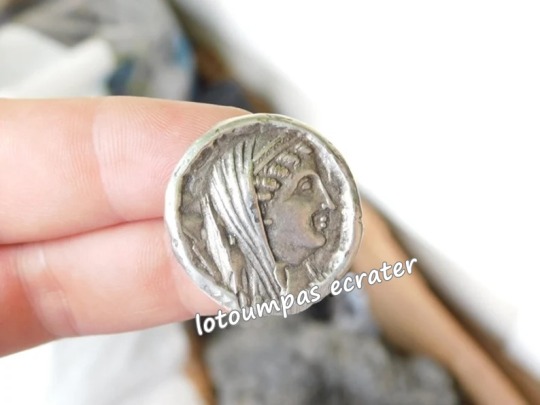
Arsinoe Dekadrachm Ancient Coin Ptolemaic Kingdom Egypt Reproduction Replica Coin - Lotoumpas.
https://lotoumpas.ecrater.com/
#egypt#egyptian#greek#greece#ancient#coin#arsinoe#queen arsinoe#decadrachm#dekadrachm#ptolemy#kingdom#ptolemaic#collector#collectible#collectibles
0 notes
Text
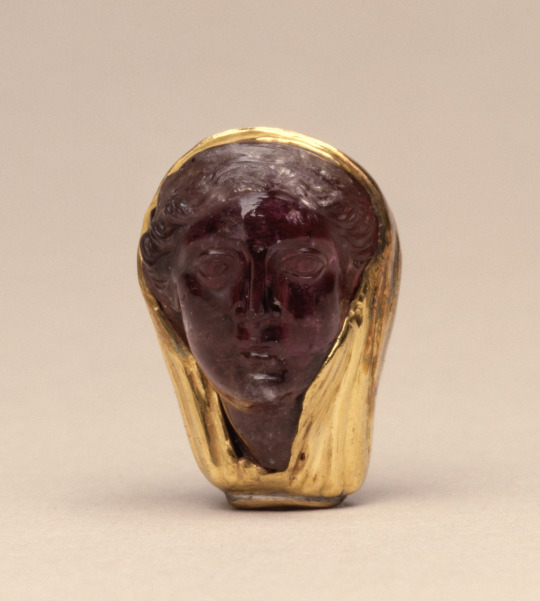
Amethyst carving of Queen Arsinoe II set in a gold mount, Ptolemaic Egypt, 3rd century BC
from The Walters Art Museum
1K notes
·
View notes
Text
The Lost Queen - II
— summary: You woke up near a military camp without remembering how and why you got there, you didn’t understand why they were dressed like ancient Greeks, all you knew was that you weren’t safe and you needed to get out of that place as soon as possible. Too bad for you that you found yourself attracting unwanted attention from the Macedonian King and he won’t let you go so easily.
— genre: yandere, dark!au.
— warnings: time travel, obsessive and possessive behavior, murder, mention of torture, kidnapping, angst, fluffy (very rarely), dub-con, possibly smut.
— pairing: yandere!alexander the great x female!reader, yandere!generals x female!reader
— word count: +1,820.
— tag list: @devils-blackrose, @faerykingdom, @hadesnewpersephone, @mariaelizabeth21-blog1 , @kadu-5607
— the lost queen series masterlist.
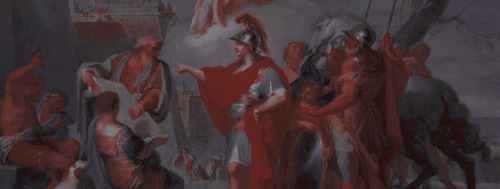

Chapter 2
You were afraid.
In fact, you felt mixed emotions. Fear, dread, horror, terror.
You didn't know why the hell you were in an old military camp, let alone why you were facing one of the greatest conquerors in history. Nothing that was happening made sense and your mind tried to look for logical answers, but it was in vain.
Because nothing that was in front of you was logical.
Maybe it was a really bizarre dream, maybe you were high or drunk, but you knew better. It was real and very real.
Nothing made sense and you felt like crying and going to your mother's lap for comfort but you couldn't do that. Not while you were being held by a scarred man and the others were staring at you with curiosity and... disdain? You couldn't tell.
How did you end up there? It was your first question. Your last memory was of you in your room, reading a book about the conqueror and falling asleep. Was that book cursed? No, that was not possible. But it will be? It seemed like the only acceptable option considering the fact that you were over 2,000 years in the past.
Fuck.
You took a deep breath, trying at all costs to avoid the urge to scream and cry. That wouldn't be acceptable to do now, you needed to stay calm and try to find a solution.
''Can you speak greek?'' You blinked in surprise when one of the men addressed you. It was the one who was next to Alexander. You glanced at him lightly, why he looked familiar?
''Hephaestion, I don't think she's fine or that she even understands what we're talking about.'' One of the slightly tall men spoke up. You shifted your gaze to him when you heard him say the name.
Hephaestion.
Oh, oh.
''It doesn't hurt to ask, Ptolemy.'' Another man said. You looked at him and blushed a little. He was handsome, maybe not by 21st century beauty standards, but he was attractive. Blonde hair and dark blue eyes.
And Ptolemy? Like in Ptolemy I Soter of the Ptolemaic Dynasty?
''She could be a spy sent by the persians. I mean, just look at the way she's dressed.'' The man with dark brown hair and green eyes said, looking you up and down with disdain.
You glared at him, daring him to say one more thing about your pajamas. Yes, it wasn't the kind of clothes they wore but it suited you it was comfortable and the print had kittens!
Adorable.
But the man held your gaze and you shuddered slightly as you noted their intensity.
''Look at the way she's dressed, friends. She clearly is a whore.'' One of the men said, looking at your breasts shamelessly.
If you weren't trapped in another man's arms, you would have kicked ass.
''Whore is my hand in your face if you say another word!'' The words came out before you could stop yourself and everyone looked at you in shock and you felt like slapping yourself.
You could have feigned madness, claimed amnesia or that you couldn't speak greek and, you really didn't, but apparently the ''magic'' that brought you to this place decided not to screw you around so much.
''She has spirit!'' The man holding you laughed and you glared at him.
Finally, Alexander decided to say something.
''Bring her to my tent. I want you all there.'' Were his only words and he turned his back on you without another word, with Hephaestion following, but not before giving you one last look.
You gasped as you began to be dragged towards what appeared to be the King's tent. Several people in the camp watched you curiously as you were led away and followed by the other generals.
You were so fucked up and not the way you liked it.

Alexander didn't know what to do with himself at that moment. He didn't understand what was going on and he hated it.
There were so many questions in the King's mind and none of them were answered. But the most puzzling of them was why he felt awkward around you.
Alexander felt an unknown feeling and what it attracted to you. How a stallion was attracted to a mare in heat. Not that he was thinking about sleeping with you, no, it wasn't that but he felt weird.
It was like he already knew you and that bothered him a lot. You had never seen each other, he was sure of that, but then why did he feel that way?
He needed answers and fast. He looked at his best friend who was looking at him with concern.
''Are you alright, Alexander?'' Hephaestion's soft and warm voice rang out and the friend touched his shoulder to try to calm him down.
''I'm fine, just tired.'' He lied quickly and something told him that Hephaestion didn't believe his words.
But there was no time for questions, not when the mystery woman was led into his tent, surrounded by the curious generals. Alexander frowned, but held the pose.
He looked right at her and his mind filled with disturbing thoughts.
She was the strangest woman he had ever met in his life. She was beautiful, albeit in a different way, but what really drew him to her was the fear in her eyes, the kind of genuine dread he had only ever seen in the eyes of his enemies. And the way she was dressed… He had never seen such clothes, even in Persia.
And that attracted him.
Alexander cleared his throat before asking the question that had been on her mind since he met her, ''Who are you and what are you doing in my camp?'' The King's voice was serious and authoritative and he could have sworn he saw her shudder.
The young woman opened her mouth to speak, but stopped and closed it again, avoiding Alexander's piercing gaze. It made him uncomfortable, but he could not and would not show weakness in front of anyone, let alone in front of his generals and a complete stranger.
He watched her for a few seconds and realized what made her sulk, the fact that she was still being held by Cleitus the Black.
''Let her go.'' It was a simple command but the general obeyed instantly. Alexander smiled a little when he noticed that the woman's posture visibly relaxed when she was released.
''I'll ask you one more time.'' Alexander said and moved a little closer to the woman, ''And I suggest you answer.''
She just stared at him as if she was seeing a god in front of her. Well, maybe he was a god.
''Who are you and what are you doing in my camp?''
''I'm (Y/N) and I don't know how I came to be in your camp.'' She finally said it in a low voice but he could hear it loud and clear.
Alexander was stunned. (Y/N)... A name he had never heard in his life and yet it seemed to suit this woman. And when he was finally able to hear her voice again, the King found himself wishing he could hear her speak more often. She was so strange yet so endearing and Alexander found himself wanting to know everything about her and he would.
He was the King, after all, and he always got what he wanted.
"It's an unusual name. What it means?''
She shrugged, ''I don't know. I never tried to find out.''
She was so insolent and disrespectful. Did she not know who she was talking to?
A laugh was heard and Alexander glared at Nearchus, who stopped laughing at the same moment.
''Where are you from?'' Alexander asked, looking at her curiously. He had decided that she wasn't a threat, she seemed too stupid to be a threat anyway.
She thought for a moment and smiled. Alexander felt his heart skip a beat when she smiled at him.
''Uh…I come from a very, it's... a distant place.'' She said between pauses.
Alexander scoffed. She was a terrible liar, and he felt like laughing when she looked insulted when he scoffed.
''And where is this place so far away?'' He insisted.
(Y/N) glared at him.
''As far away as you could tell.''
''The name?''
If she looked angry before, she looked furious now.
''You would not understand. It's not your language.''
''Really?'' Alexander thought, ''And how come you speak my language so well?''
She paled, but recovered very quickly.
''I studied.''
Alexander hummed and decided to stop questioning her. For now. She looked tired and scared, from what he could read from her body language and something inside him told him not to disturb her anymore.
''Call the servants. Give her a tent, clothes and food.''
All of her generals looked perplexed, even Hephaestion.
Even the woman, (Y/N), looked confused.
In fact, he didn't even know why he was doing this, but he needed to make sure she was going to be alright.
It was a need that screamed inside him. The need to protect her and he didn't know why.
He needed to find out about her. Who was she, where did she come from, everything.

You were taken to a tent away from the camp and left alone.
You looked around curiously. It was a small tent but it had a small bed, which you recognized as a cot, and some candles. It was just that.
You wondered if you could freak out now, but it wasn't feasible. No, everyone could hear it and it would get you in more trouble than you already were.
Fuck, fuck, fuck.
You started to feel the tears in your eyes. You wanted to cry and scream and cry some more. But you couldn't. Not when you were in such a vulnerable position and you were scared.
So scared.
You were scared of everything. Fear of being tortured, dying and being abused. You noticed some soldiers looking at you with lust and it scared you so much. What would stop them from making you a booty? A toy?
Nothing.
And it was so desperate.
You sat down on the small cot and finally allowed yourself to cry, the hot tears running down your face, as you sobbed and contained your screams of frustration.
You didn't even notice the servant entering your tent and placing a plate of food beside you or the clothes that were brought for you. You didn't notice because you were so desperate and you were sinking in your fear and despair.
You needed to go. You needed to go back to the 21st century.
And you had no idea how to do it.
And just that thought made you cry even harder.

— lady l: I was going to post it tomorrow but I got some time and I didn't want to keep you waiting any longer so finally chapter 2 is here. I hope you enjoyed it, what did you think of Y/n's first interaction with Alexander and some generals? Feel free to give me your opinion. I love you all and until the next chapter!! ❤️
#history#yandere history#yandere historical characters#yandere alexander the great#yandere alexander the great x reader#alexander the great x reader#long fic#the lost queen
421 notes
·
View notes
Note
I know you don't usually do these kinds of posts, but you're probably one of the most implicated in black history month people that I follow so I wanted to ask you, as I already value your opinions in Acotar, what do you think of the documentary where actual historians claim Cleopatra was a black woman? Lately, this has been a pretty active topic on my fyp on TikTok, and I wanted to know a black woman's perspective on this.
Thank you in advance, and if you usually don't answer these questions or don't want to answer this one, I'll totally understand, and there's no problem at all.
I didn’t know there was a new documentary out, but when I saw the name Cleopatra I automatically sighed because I knew what was coming. This is a subject a know a little 🤏🏾 about, actually, because I researched it a bit myself in my last year of high school (and stopped because of the uh. NASTINESS associated with this particular subject) and though it’s been a few years I remembered some main, basic things, and I wanted to check a few things first.
At best, in the most CHARITABLE interpretation as far as I in my limited knowledge can tell, it would be correct to say that’s it’s POSSIBLE that she MAY have been mixed Black because, though she was part of the GREEK Ptolemaic dynasty that ruled Egypt (Ptolemy being one of Alexander the Great’s generals who got the Egyptian portion of his empire after Alexander died), that’s on her fathers side; her mother’s exact ethnicity isn’t known. Not that this won’t stop the hoteps from running off and claiming her and all of ancient Egypt as Black though So some have ***speculated*** that her mother—and thus Cleopatra—may have potentially been part Egyptian (and that goes into the issue of deciding that the “Egyptian” in this instance had to have been Black rather than MENA but that’s again a whole other can of worms). BUT it’s more likely that her mother was Greek due to the uh, PRACTICE™️ of inbreeding and it not being common for the dynasty to marry Egyptians. So it’s more probable that she was fully Greek/Macedonian and not part Egyptian, much less part Black. (Also some historians speculate she may have had Persian blood? I guess? Again it’s a can of worms, not something i’m digging deep into because of the nastiness that you often stumble across) Unless there’s a new study confirming her mother’s identity or something that I missed, it’s simply incorrect to claim that Cleopatra was undeniably Black, because though it is ***possible*** she most likely ***wasn’t.***
But this topic really upsets me, because there are LEGITIMATE Black kingdoms and empires who were mighty and well developed and powerful like the Aksumite empire and kingdoms of Kongo and Loango and the Great Zimbabwe empire and the empires of Ghana and Mali and Songhay and the Ashanti kingdom and the WHOLE SWAHILI COAST THAT WAS INVOLVED IN THE INDIAN OCEAN TRADE ROUTE and they had their own great rulers, their own kings and queens and emperors and empresses, their palaces and castles, their own cities and towns, their own complex civilizations and dynastic royal families that deserve the attention Cleopatra and ancient Egypt get. They were erased—and Egypt was not—by white people to prop themselves up as the only race capable of forming civilizations and advanced societies as a means of justifying colonization and imperialism to “civilize” the rest of the world and as a result many of those other empires have been erased from our education system here in the states and many people cling to ancient Egypt as proof that we’re not inferior and aren’t savages like white people claim due to believing that since Egypt’s in Africa it had to have been mostly Black when Egypt, and the Ptolemaic dynasty and Cleopatra in PARTICULAR, are literally the worst example that could’ve been chosen and were the only African kingdom spared erasure FOR A REASON.
Anyway, I don’t like it, it’s disingenuous and does US wrong because we need to give that energy to other African kingdoms that need and could use the fame Egypt + Cleopatra get, and we deserve a better education system to teach us this stuff. I hope this answers your question? And I don’t mind any kinds of asks 🥰
#I get the desire to claim Egypt because I remember in high school a racist white guy asked why Africans didn’t build their own civilizations#And that’s what sent me researching in the first place so I truly get the frustration but black women we can do BETTER#ask#anon#cleopatra#egypt#africa#racism#Don’t come at me in my inbox yall#antiblackness
1K notes
·
View notes